#Molecular Ecology
Text
The first is biology,* which tells us what humans truly are: clever chimps.
*Academic biology is a vast field; I draw on its ecological/evolutionary end rather than its molecular/cellular end.
"Why the West Rules – For Now: The patterns of history and what they reveal about the future" - Ian Morris
#book quotes#why the west rules – for now#ian morris#nonfiction#biology#chimps#academia#ecology#evolutionary biology#molecular biology#cellular biology
0 notes
Text
Having an internal crisis that is SO unrelatable to 99.99% of the population
#if i'm such a big proponent of monophyletic cladistics based on molecular evidence#do i have a moral responsibility to get into dna analysis instead of marine ecology#like if i want every clade to accurately represent true lineage and to hell with morphology-based taxonomy#but there are comparitively not very many people doing the genetic and protein analysis#do i have to be one of those people
1 note
·
View note
Text
Fully checked out from biochem
If I get a C, I literally dont care
#itll be my third college C grade#1st when chem bc i slept thru a midterm#2nd was molecular ecology#i fucking hate genetics and chemistry#i just develop such a disgust and check out
0 notes
Note
can u do a fanfic for e-42 miles based on Super Shy by Newjeans 🙏🏽 the song is like REALLYY CUTE AND I CANT STOP LISTENING TO IT 😣😣

e-42 miles x shy reader
summary: y/n's mind is constantly processing on how to not be awkward around miles.
content: no warnings!
a/n: both of these asks were similar so i just decided to make it into one! these requests r so sweet. thank u anon🥹🥹. also I AGREE SUPER SHY BY NEW JEANS IS SO ADDICTIVE AND THE CHOREO IS SO CUTE!!
sitting with your friends at lunch, you peeked over your shoulder to take a look at the cute boy standing with his friends. nobody knew how badly the girl wanted to make a move and claim him as hers, but there was no way of that happening.
you were fairly new to brooklyn and visions academy. you’ve been there for a couple months and settled in fine. on your first day of school, some girl approached you and invited you to sit with her and her friends at lunch. you weren’t the most outgoing person, so you were glad that someone reached out before you had to.
“so y/n, do you think anyone is cute at this school?” one of your friends, layla, asked you.
that snapped you from your thoughts, turning your head to look at your friends staring at you expectantly. you opened your mouth to say something before closing it again. you were way too scared for it to get out, not that you didn’t trust your friends, you just didn’t want anyone to overhear or constantly be teased by it. shaking your head ‘no’ your friends just went back to the conversation they were having.
you sighed, looking over your shoulder once more before going back to eating your lunch. the rest of lunch zoomed by and you went to your next class. you had biology with miles, being one of the two classes you had with him. you sat three rows behind him, most classes staring at the back of his head. he’s never turned around or noticed, you’re pretty sure he doesn’t even know you exist.
sitting in class, you just listened to the teacher explain the direction for a project she was assigning. it was a partner project that she would be assigning. hearing her call out names, your head snapped when you heard your name being followed by miles’ name. you couldn’t believe it. this was gonna be so bad because he made you nervous, you just imagine the whole thing being awkward. you starting shuffling the stuff on your desk, making space for miles who was walking over. he pulls up a chair and slides it across from you, the desk being in between you guys. you didn’t want to make eye-contact so you just played with your hands and bit your lips. miles raised a brow at your behavior thinking it was cute, while your thoughts were going crazy thinking you bombed your only opportunity.
“i’m miles morales, you’re y/n right?” he asked trying to break the silence. you nodded in response and he gave you a grin before continuing, “so for the project, i was thinking we do the botany and ecology unit since the molecular biology unit is really long and i don’t really wanna do the genetics part.”
you blessed miles in your mind, thanking him for starting the conversation easily. “uh, yeah i would be fine with that,” you responded. giving you a glanced, he responded “okay, cool” before turning to write in his notebook.
“i’m not doing anything after school so we could meet in the library, can’t go to my dorm since my roommate is a pretty loud gamer,” he said. you simply nodded. the bell rang signifying that class was over.
the school day passed and all you could think of is how you were gonna talk to miles after school without sounding stupid. now, you were naturally shy, but that didn’t mean you couldn’t have conversations or lots of friends. it was only miles who made you really nervous and you didn’t want to embarrass yourself in front of him or stumble over your friends.
walking over to the library, you had two paper cups in hand containing hot chocolate. you had wanted one and decided to get one for miles too (also maybe trying to win yourself some brownie points to make him like you a little bit). walking into the library, you look over, already seeing miles at a table with books spread out around him. walking up and stopping in front of him, you gave him a smile.
“i stopped by a cafe before coming here… i hope you like hot chocolate,” you said, trying to sound as calm as possible. miles looking up at you, gave you a grateful smile before grabbing the cup out of your hands.
“thanks, make yourself at home since we gotta work on this shih.”
you followed by sitting down and started taking your books and notebooks out. after being spread out, miles gave you a piece of scratch paper with a draft of what he kinda wants to do for the project. reading over it, you deemed everything good and nodded at him. you both discussed where to begin and he shared a powerpoint with you.
an hour passed and you start to feel more confident in your abilities to talk to miles. discussing work and occasional small talk has slightly taken away your nervousness of talking to the pretty boy.
“i feel like we should put more detail and description on the photosynthesis pa-” you began.
“can you say that again?”
“that we should put more detail on this part?”
“no, say photosynthesis.”
“photosynthesis?”
“the way you say that is cute, ma,” he grinned.
your head literally malfunctioned at that moment. there was no way the boy that you have been pining over for the past month just called you cute. you simply nodded, not knowing how to respond when miles kept on pushing.
“you know, i catch you staring at me a lot,” he smugly said, resting his chin on his hand.
“i don’t know- i mean, sorry?”
“nah, i think it’s cute. i think your cute in general.”
you felt your face flush and looked to the side, scratching your neck. “thanks miles,” you tried to sound appreciative, but accepting compliments was so hard and weird for you. you didn’t want to come off as stuck up, but also didn’t want to come off as ungrateful either. thankfully, your shyness didn’t back miles off.
“you wanna go out with me sometime? we could go to that cafe you went to earlier. whatever is comfortable for you.”
miles saying that immediately brought you out of your shell. “wait, really?” you asked with a shocked look on your face. miles leaned back in his seat, nodding, “of course, hermosa.” you nodded fast, a big smile on your face. who was going to say no to a date with miles morales?
you both forgot existence of the project in that moment and kept on talking.
extra!
the next day at lunch, you were sitting with your friends talking. miles walked by your table and you gave him a small wave, he waved back following a grin before continuing to catch up with his friends. your friends looked at you in shock.
“uhm mrs. super shy? wanna tell us what that was about?” your friend asked.
“give us all the deets. you just got the school’s pretty boy attention.” your other friend asked. you sighed knowing that even after you explain, the questions and hype from your friends will be never ending.
#miles morales x reader#spiderverse x reader#earth 42 miles morales#earth 42 miles morales x reader#miles x reader#earth42!miles x reader#earth42!miles#miles morales x you#miles g#e!42 miles morales x reader#miles morales#earth 42 miles fluff#earth 42 miles x you#prowler miles#miles morales prowler#atsv miles#astv#miles morales fanfiction#earth 42#across the spiderverse#itsv#spiderman across the spiderverse
2K notes
·
View notes
Text
Thursday 26th May 2022
So… a very long hiatus and have been meaning to find the time to come back and post but it’s been one thing after another ahh! Anyway, it’s been full of ups and downs this hiatus. My health taking a toll and being dismissed by medical experts, but I’ve changed Gp’s and had health checks there and made them aware so that’s going okay!
My mentoring is going well, Dale is lovely and so helpful actually. Although, I was nervous about getting a new mentor (Beth had to leave due to not being able to juggle 2 jobs), Dale is actually brilliant and so on top of everything!
I’m also in the process of being given a date for my ADHD/ ADD assessment appointment which is so exciting, it’s taken so long but I’m finally getting through now and things are really starting to look up!
It’s exam season as well, I’ve actually been really calm and happy despite there being exams. I’ve been finding a nice balance between work and life. I’ve been going to the beach and out and about more and then still finding time for studies and I just feel so refreshed and lovely due to it.
I had my experimental biology exam last week which was my first exam and it was such a nightmare! So I get extra time being a disabled student and us extra timers are in a separate building to everybody else. We were forgotten about so our building wasn’t allocated the exam and it was requesting a password for us to get onto this online exam and nobody, not even the invigilators knew it and we didn’t start until 9:30 rather than 9 and everything had to be changed timing wise to give us a chance gahhhh!!!
Anyway, microbiology & molecular biology went… okay. Sadly I didn’t find the time to revise it as much as I’d like to but I feel confident about it y’know. I love microbiology and it just comes so naturally to me.
This weekend me and my partner and his family are going to Torquay. His family have been invited to a wedding that had been postponed for years due to covid and we weren’t invited sadly. But it’s my first ever holiday and I’ve just been invited to tag along and me and my partner do our own thing. I love him and I’m so excited! :)
I hope you guys have been okay. I’m really sorry for such a long hiatus!
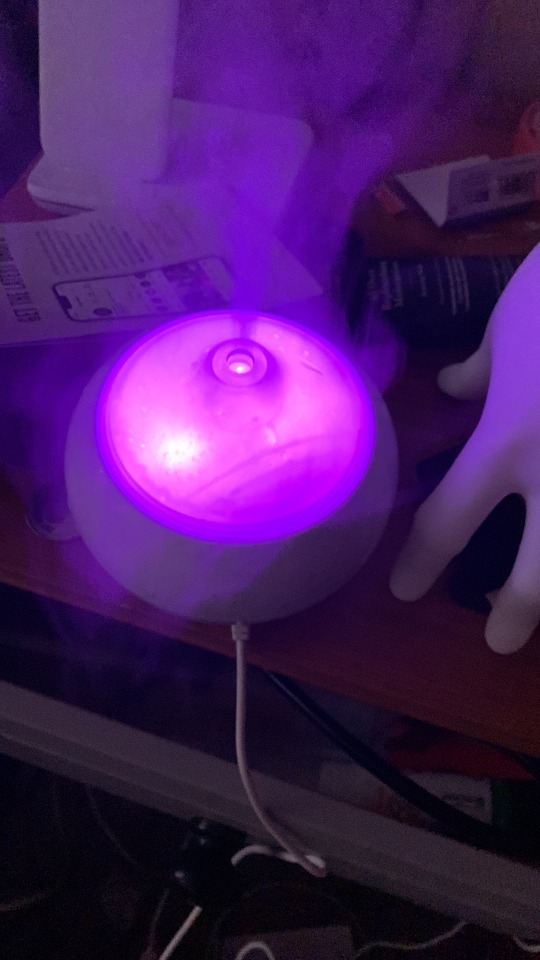
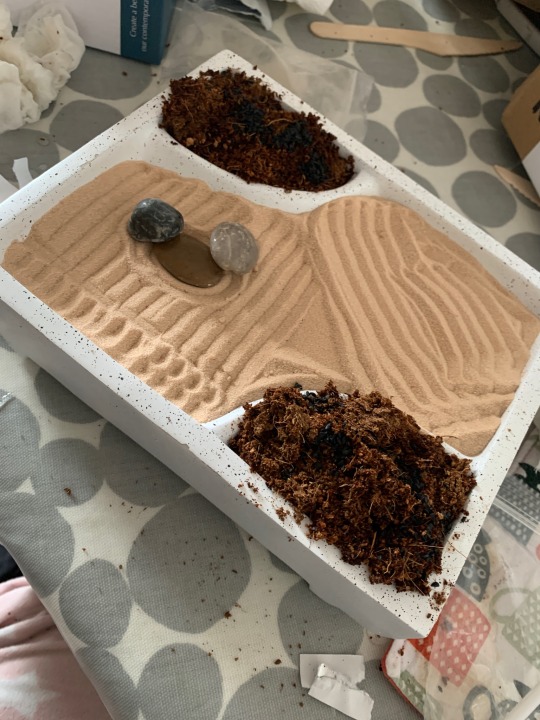
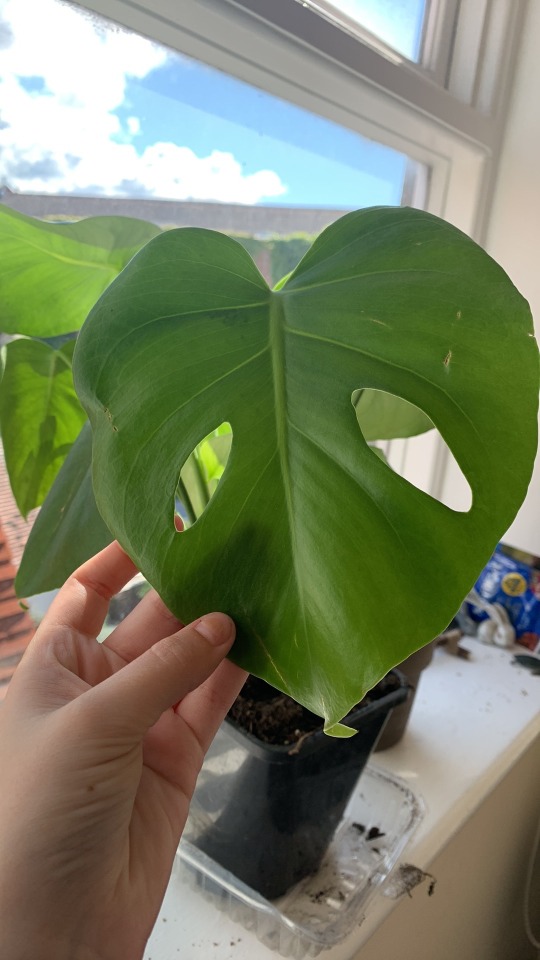
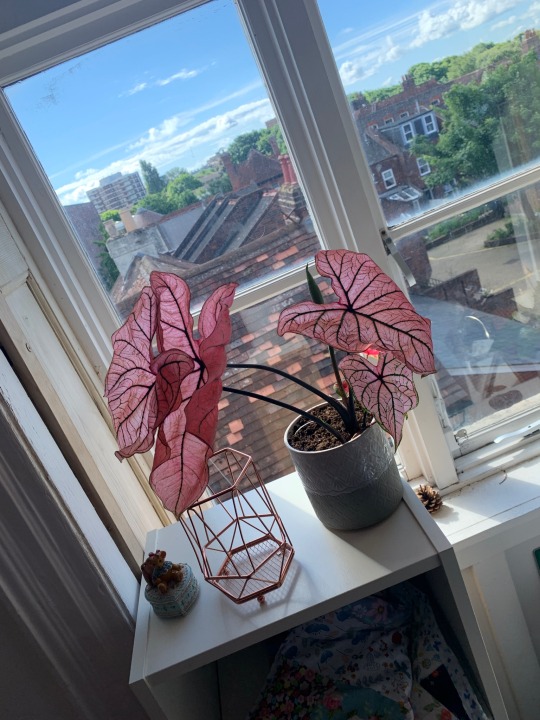

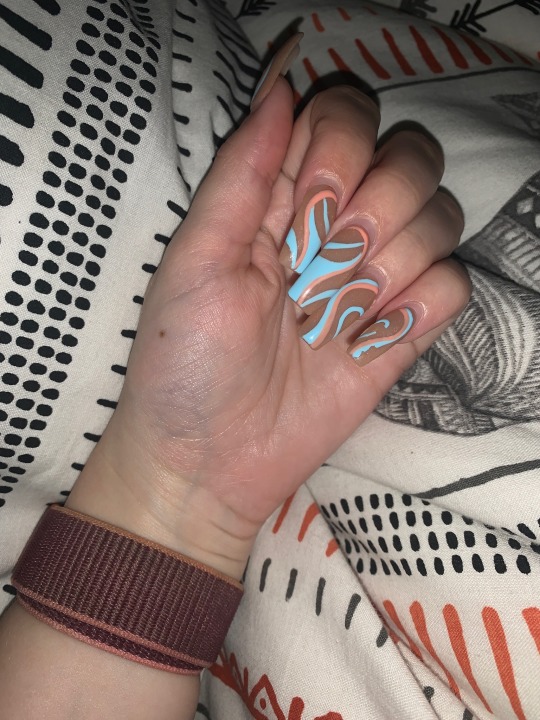
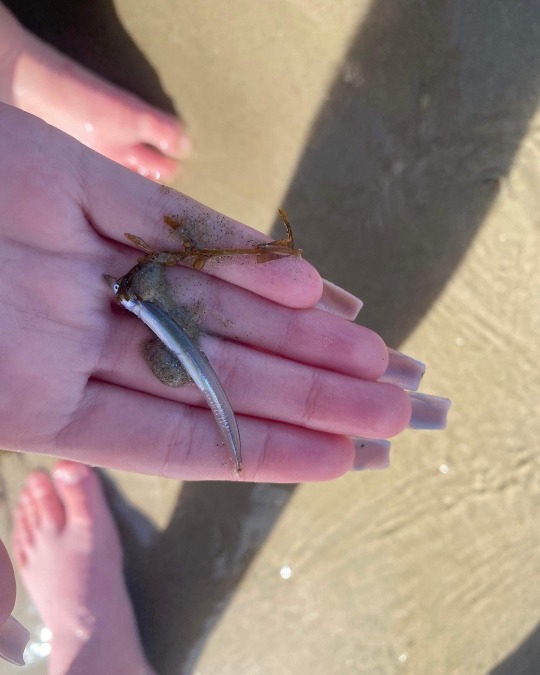

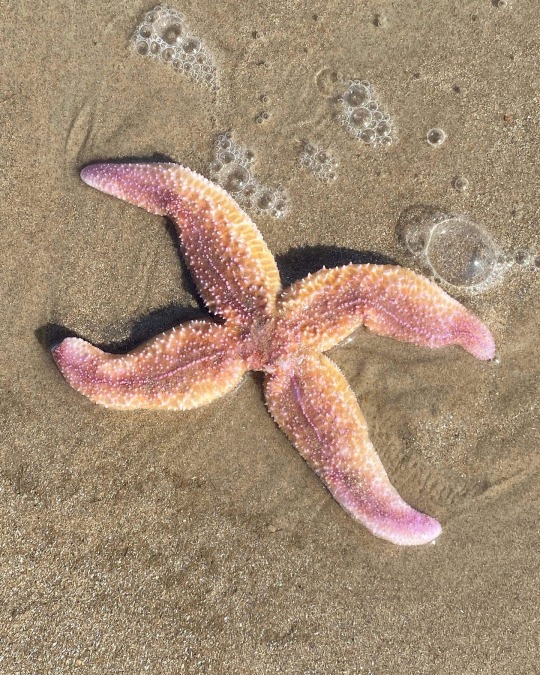
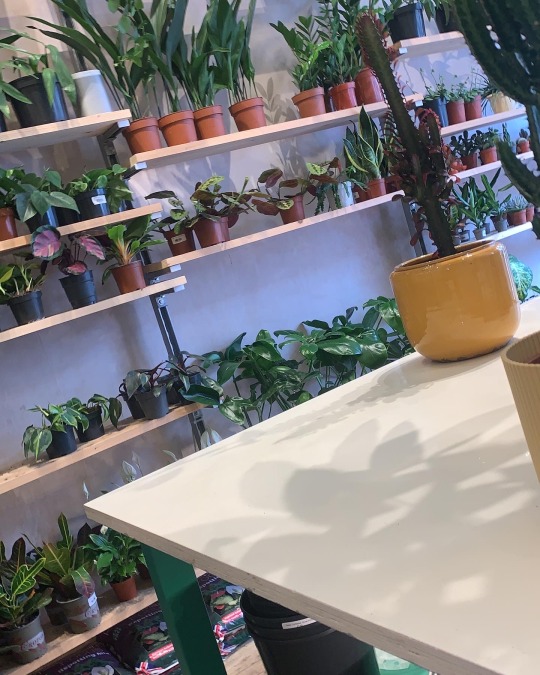
#biology#adhd#attention deficit hyperactivity disorder#my adhd#biology student#university#revision#uni#university student#microbiology#exams#plantnerd#book worm#books#ecology#flash cards#booklover#microbiology and molecular biology#experimental biology#statistics#cell biology and biochemistry
0 notes
Note
hello!! I'm a highschooler who's high-key OBSESSED with vampire squids and I really, really want to do research on them in the future if possible. Aside from the obvious things that I have to do (major in marine bio, get involved in as many lab/research projects as possible in undergrad, etc), what else can I do to ensure that I get the chance to study these dudes in the future? (I hope this question makes sense)
I pretty much want to dedicate my life to them because I love them so much. Also, you are one of my biggest inspirations for pursuing teuthology!! Thank you so much for everything you do!! The Ologies podcast episode that you featured in did wonders for my passion ❤️❤️❤️
This is amazing! I love this!
Ok so we got good news and medium news. Good news, there are lots of people working with cephalopods, and you can totally work with vampire squid if this is your calling. Medium news is that generally speaking people don't work on JUST vampire squid. In my personal experience, when it comes to working with animals like this, that we don't see very often, many scientists end up working on a bunch of animals INCLUDING that animal. Sometimes people will work on one animal their whole careers, especially those that are good for keeping in the lab. Deep sea critters are just... harder! So for example take Kat Bolstad at ALCES in New Zealand- her lab works on a whole bunch of deep sea cephalopods! A lot of this also depends on the KIND of science you're doing. Are you working on fossils? Molecular Biology? Behavior? Ecology? This also determines how specific the animals you'll work on will be.
Other than the things you mentioned, just being in conversation with other scientists online and reading as much of the literature as you can so you come in with an existing deep knowledge of the animal is great. This is also super useful because you'll learn about WHO is working on these animals that you'd need to meet. A lot of the squid biologists talking to each other happens on twitter. It helps when the scientists who might hire you already know you and social media helps with that!
250 notes
·
View notes
Text
building on that best science poll bc biology is far in the lead !! also feel free to go into specifics in the tags since i had to choose a broad 10 options 🤧
426 notes
·
View notes
Text

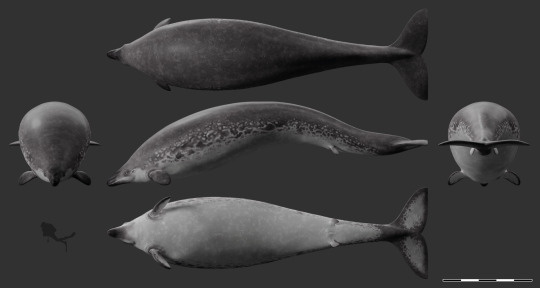
The archeocete Perucetus colossus dives through a coastal bloom of jellyfish in the Pisco Basin (southern Peru), some time during the Eocene (with bonus multiview).
I originally intended to add epibionts to this reconstruction (reflecting the specialized communities found on many living whales, especially baleen whales). Yet, interestingly, it appears that most animal epibionts and ectoparasites of modern cetaceans, such as whale barnacles (Hayashi et al. 2013) and remoras (Friedman et al. 2013), only appeared in the Neogene or late Paleogene, or have a poorly known (co-)evolutionary history, like whale lice (Pfeiffer 2009, Iwasa-Arai & Serejo 2018) and pennellids (large parasitic copepods) (Hermosilla et al. 2015). So, no epibionts* for big lad Perucetus!
References and notes about the reconstruction:
*animal epibionts. Unicellular eukaryotes like diatoms were most likely present on early cetaceans, given their prevalence on modern large marine animals (Ashworth et al. 2022). Of course, it is possible that other animals (i.e., early, less specialized representatives of modern groups, or different taxa altogether) were also already exploiting the surfaces offered by these early whales; however, this remains entirely speculative.
The reconstruction of Perucetus proposed in its original description (Bianucci et al. 2023) includes some rather odd (if interesting) choices about soft tissues, including limbs with webbed and distinguishable fingers, and a manatee-like tail. While these choices might be defendable in light of the rather basal status of Perucetus among cetaceans, I opted for a more derived look based on the assumption that fully marine cetaceans like basilosaurids would have probably rapidly acquired hydrodynamically favorable adaptations, pushing them towards a more familiar Neoceti-like appearance (even though Perucetus itself was likely a poor swimmer (Bianucci et al. 2023), it seems likely to me that this was a secondarily acquired trait, given the less extreme morphology of other basilosaurids).
Reconstruction in the multiview scaled to ~18 m in length after the estimations of Bianucci et al. (2023).
References:
Ashworth, M. P., Majewska, R., Frankovich, T. A., Sullivan, M., Bosak, S., Filek, K., Van de Vijver, B., Arendt, M., Schwenter, J., Nel, R., Robinson, N. J., Gary, M. P., Theriot, E. C., Stacy, N. I., Lam, D. W., Perrault, J. R., Manire, C. A., & Manning, S. R. (2022). Cultivating epizoic diatoms provides insights into the evolution and ecology of both epibionts and hosts. Scientific Reports, 12(1), Article 1. https://doi.org/10.1038/s41598-022-19064-0
Bianucci, G., Lambert, O., Urbina, M., Merella, M., Collareta, A., Bennion, R., Salas-Gismondi, R., Benites-Palomino, A., Post, K., de Muizon, C., Bosio, G., Di Celma, C., Malinverno, E., Pierantoni, P. P., Villa, I. M., & Amson, E. (2023). A heavyweight early whale pushes the boundaries of vertebrate morphology. Nature, 620(7975), Article 7975. https://doi.org/10.1038/s41586-023-06381-1
Friedman, M., Johanson, Z., Harrington, R. C., Near, T. J., & Graham, M. R. (2013). An early fossil remora (Echeneoidea) reveals the evolutionary assembly of the adhesion disc. Proceedings of the Royal Society B: Biological Sciences, 280(1766), 20131200. https://doi.org/10.1098/rspb.2013.1200
Hayashi, R., Chan, B. K. K., Simon-Blecher, N., Watanabe, H., Guy-Haim, T., Yonezawa, T., Levy, Y., Shuto, T., & Achituv, Y. (2013). Phylogenetic position and evolutionary history of the turtle and whale barnacles (Cirripedia: Balanomorpha: Coronuloidea). Molecular Phylogenetics and Evolution, 67(1), 9–14. https://doi.org/10.1016/j.ympev.2012.12.018
Hermosilla, C., Silva, L. M. R., Prieto, R., Kleinertz, S., Taubert, A., & Silva, M. A. (2015). Endo- and ectoparasites of large whales (Cetartiodactyla: Balaenopteridae, Physeteridae): Overcoming difficulties in obtaining appropriate samples by non- and minimally-invasive methods. International Journal for Parasitology: Parasites and Wildlife, 4(3), 414–420. https://doi.org/10.1016/j.ijppaw.2015.11.002
Pfeiffer, C. J. (2009). Whale Lice. In W. F. Perrin, B. Würsig, & J. G. M. Thewissen (Eds.), Encyclopedia of Marine Mammals (Second Edition) (pp. 1220–1223). Academic Press. https://doi.org/10.1016/B978-0-12-373553-9.00279-0
#'a heavyweight early whale pushes the boundaries of...' blablabla you've all read it by now#i have nothing to add#it's fat#look at it#that is all#perucetus#cetacean#mammal#vertebrate#eocene#cenozoic#paleontology#palaeoblr#paleoart#my art
402 notes
·
View notes
Note
Hi Dr Scherz, what were your favourite subjects back when you were studying undergraduate zoology? 🍀
Totally different than what I expected! I thought the core zoology courses would be my favourites, but in the end, I think my favourite courses were Molecular Phylogenetics, Evolutionary and Ecological Genetics, Evolution of Sex and Breeding Systems, Evolution of Parental Care, Developmental Biology, and Parasite Biology. I can attribute 80% of my enjoyment of those courses to the fantastic lecturers that we had at the University of Edinburgh, who conveyed both deep knowledge of and enthusiasm for the subject matter.
My least favourite courses were also the courses I fared worst in, i.e. Medical Biology, Principles of Ecology, and Population and Community Ecology. Surprise surprise, I am no ecologist. I should by rights also probably have failed Biological Chemistry in my first year, but somehow I scraped by with a tolerable mark.
#undergraduate#zoology#animals#biology#university#undergrad#University of Edinburgh#BSc#about me#answers by Mark#tzatziki-boy
100 notes
·
View notes
Text
True altruism is rare behavior in animals, but a new study by Penn State researchers has found that honey bees display this trait. Additionally, they found that an evolutionary battle of genetics may determine the parent from whom they inherit it.
For the study, published in the journal Molecular Ecology, the researchers examined the genetics behind "retinue" behavior in worker honey bees, who are always female. After the worker bees are exposed to the queen bee's pheromone, they deactivate their own ovaries, help spread the pheromone to the other worker bees, and tend to the queen and the eggs she produces.
This behavior is considered altruistic because it ultimately benefits the ability of the queen to produce offspring, while the worker bee remains sterile. For honey bees, the queen is typically the mother of all—or nearly all—the bees in the hive.
The researchers found that the genes that make worker bees more receptive to this pheromone—and therefore more likely to display the retinue behavior—can be passed down from either the mother or father bees. However, the genes only result in altruistic behavior when they are passed down from the mother.
Continue Reading.
131 notes
·
View notes
Text
GUys! Stop putting the levels of biological integration against each other they are all great in their own way!
ECOLOGY is FASCINATING
DEMECOLOGY is COMPLEX
PHYSIOLOGY
HISTOLOGY is BEAUTIFUL
CYTOLOGY is USEFUL
MOLECULAR BIOLOGY is INTERESTING
48 notes
·
View notes
Text
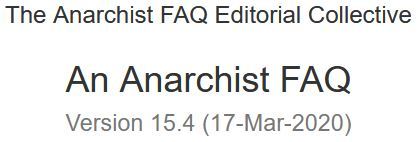
E.1.1 Is industry the cause of environmental problems?
Some environmentalists argue that the root cause of our ecological crisis lies in industry and technology. This leads them to stress that “industrialism” is the problem and that needs to be eliminated. An extreme example of this is primitivism (see section A.3.9), although it does appear in the works of “deep ecologists” and liberal greens. However, most anarchists are unconvinced and agree with Bookchin when he noted that “cries against ‘technology’ and ‘industrial society’ [are] two very safe, socially natural targets against which even the bourgeoisie can inveigh in Earth Day celebrations, as long as minimal attention is paid to the social relations in which the mechanisation of society is rooted.” Instead, ecology needs “a confrontational stance toward capitalism and hierarchical society” in order to be effective and fix the root causes of our problems. [The Ecology of Freedom, p. 54]
Claiming that “industrialism” rather than “capitalism” is the cause of our ecological problems allowed greens to point to both the west and the so-called “socialist” countries and draw out what was common to both (i.e. terrible environmental records and a growth mentality). In addition, it allowed green parties and thinkers to portray themselves as being “above” the “old” conflicts between socialism and capitalism (hence the slogan “Neither Right nor Left, but in front”). Yet this position rarely convinced anyone as any serious green thinker soon notes that the social roots of our environmental problems need to be addressed and that brings green ideas into conflict with the status quo (it is no coincidence that many on the right dismiss green issues as nothing more than a form of socialism or, in America, “liberalism”). However, by refusing to clearly indicate opposition to capitalism this position allowed many reactionary ideas (and people!) to be smuggled into the green movement (the population myth being a prime example). As for “industrialism” exposing the similarities between capitalism and Stalinism, it would have been far better to do as anarchists had done since 1918 and call the USSR and related regimes what they actually were, namely “state capitalism.”
Some greens (like many defenders of capitalism) point to the terrible ecological legacy of the Stalinist countries of Eastern Europe and elsewhere. For supporters of capitalism, this was due to the lack of private property in these systems while, for greens, it showed that environmental concerns where above both capitalism and “socialism.” Needless to say, by “capitalism” anarchists mean both private and state forms of that system. As we argued in section B.3.5, under Stalinism the state bureaucracy controlled and so effectively owned the means of production. As under private capitalism, an elite monopolised decision making and aimed to maximise their income by oppressing and exploiting the working class. Unsurprisingly, they had as little consideration “first nature” (the environment) as they had for “second nature” (humanity) and dominated, oppressed and exploited both (just as private capitalism does).
As Bookchin emphasised the ecological crisis stems not only from private property but from the principle of domination itself — a principle embodied in institutional hierarchies and relations of command and obedience which pervade society at many different levels. Thus, ”[w]ithout changing the most molecular relationships in society — notably, those between men and women, adults and children, whites and other ethnic groups, heterosexuals and gays (the list, in fact, is considerable) — society will be riddled by domination even in a socialistic ‘classless’ and ‘non-exploitative’ form. It would be infused by hierarchy even as it celebrated the dubious virtues of ‘people’s democracies,’ ‘socialism’ and the ‘public ownership’ of ‘natural resources,’ And as long as hierarchy persists, as long as domination organises humanity around a system of elites, the project of dominating nature will continue to exist and inevitably lead our planet to ecological extinction.” [Toward an Ecological Society, p. 76]
Given this, the real reasons for why the environmental record of Stalinist regimes were worse that private capitalism can easily be found. Firstly, any opposition was more easily silenced by the police state and so the ruling bureaucrats had far more lee-way to pollute than in most western countries. In other words, a sound environment requires freedom, the freedom of people to participate and protest. Secondly, such dictatorships can implement centralised, top-down planning which renders their ecological impact more systematic and widespread (James C. Scott explores this at great length in his excellent book Seeing like a State).
Fundamentally, though, there is no real difference between private and state capitalism. That this is the case can be seen from the willingness of capitalist firms to invest in, say, China in order to take advantage of their weaker environmental laws and regulations plus the lack of opposition. It can also be seen from the gutting of environmental laws and regulation in the west in order to gain competitive advantages. Unsurprisingly, laws to restrict protest have been increasingly passed in many countries as they have embraced the neo-liberal agenda with the Thatcher regime in the UK and its successors trail-blazing this process. The centralisation of power which accompanies such neo-liberal experiments reduces social pressures on the state and ensures that business interests take precedence.
As we argued in section D.10, the way that technology is used and evolves will reflect the power relations within society. Given a hierarchical society, we would expect a given technology to be used in repressive ways regardless of the nature of that technology itself. Bookchin points to the difference between the Iroquois and the Inca. Both societies used the same forms of technology, but the former was a fairly democratic and egalitarian federation while the latter was a highly despotic empire. As such, technology “does not fully or even adequately account for the institutional differences” between societies. [The Ecology of Freedom, p. 331] This means that technology does not explain the causes for ecological harm and it is possible to have an anti-ecological system based on small-scale technologies:
“Some of the most dehumanising and centralised social systems were fashioned out of very ‘small’ technologies; but bureaucracies, monarchies, and military forces turned these systems into brutalising cudgels to subdue humankind and, later, to try to subdue nature. To be sure, a large-scale technics will foster the development of an oppressively large-scale society; but every warped society follows the dialectic of its own pathology of domination, irrespective of the scale of its technics. It can organise the ‘small’ into the repellent as surely as it can imprint an arrogant sneer on the faces of the elites who administer it … Unfortunately, a preoccupation with technical size, scale, and even artistry deflects our attention away from the most significant problems of technics — notably, its ties with the ideals and social structures of freedom.” [Bookchin, Op. Cit., pp. 325–6]
In other words, “small-scale” technology will not transform an authoritarian society into an ecological one. Nor will applying ecologically friendly technology to capitalism reduce its drive to grow at the expense of the planet and the people who inhabit it. This means that technology is an aspect of a wider society rather than a socially neutral instrument which will always have the same (usually negative) results. As Bookchin stressed, a “liberatory technology presupposes liberatory institutions; a liberatory sensibility requires a liberatory society. By the same token, artistic crafts are difficult to conceive without an artistically crafted society, and the ‘inversion of tools’ is impossible with a radical inversion of all social and productive relationships.” [Op. Cit., pp. 328–9]
Finally, it should be stressed that attempts to blame technology or industry for our ecological problems have another negative effect than just obscuring the real causes of those problems and turning attention away from the elites who implement specific forms of technology to further their aims. It also means denying that technology can be transformed and new forms created which can help produce an ecologically balanced society:
“The knowledge and physical instruments for promoting a harmonisation of humanity with nature and of human with human are largely at hand or could easily be devised. Many of the physical principles used to construct such patently harmful facilities as conventional power plants, energy-consuming vehicles, surface-mining equipment and the like could be directed to the construction of small-scale solar and wind energy devices, efficient means of transportation, and energy-saving shelters.” [Bookchin, Op. Cit., p. 83]
We must understand that “the very idea of dominating first nature has its origins in the domination of human by human” otherwise “we will lose what little understanding we have of the social origin of our most serious ecological problems.” It this happens then we cannot solve these problems, as it “will grossly distort humanity’s potentialities to play a creative role in non-human as well as human development.” For “the human capacity to reason conceptually, to fashion tools and devise extraordinary technologies” can all “be used for the good of the biosphere, not simply for harming it. What is of pivotal importance in determining whether human beings will creatively foster the evolution of first nature or whether they will be highly destructive to non-human and human beings alike is precisely the kind of society we establish, not only the kind of sensibility we develop.” [Op. Cit., p. 34]
#environment#climate crisis#climate change#environmentalism#faq#anarchy faq#revolution#anarchism#daily posts#communism#anti capitalist#anti capitalism#late stage capitalism#organization#grassroots#grass roots#anarchists#libraries#leftism#social issues#economy#economics#climate#ecology#anarchy works#solarpunk#anti colonialism#mutual aid#cops#police
16 notes
·
View notes
Note
If you don't mind me asking, what exactly is your job and degree? Getting into the field of entomology is a bit intimidating and I would appreciate any any advice.
i tend to be a little cagey about my exact job since my field is quite small and there's enough people following me that the chances of someone deciding to take offense to something and Get Weird at me are nonzero, but that's probably excessive paranoia on my part. then again beloved internet bug person mossworm got recently sacked from their job on account of weirdo online tattletales so maybe not.
anyway i can say i work for a government agency identifying insects from a pretty wide geographic range, looking for new exotic species and potential pests. during the busy season i spend most of my time processing huge volumes of raw trap samples, pulling out insect groups of interest, mostly woodboring beetles, for myself or one of the other entomologists in the lab to identify to species. during the off-season when we're not getting tons of new samples i get a little more free reign to work on other projects of my own design, so for example lately i've been working on my bee identification skills and am slowly putting together a large reference collection of native bee species that i reserved from years of insect trap by-catch.
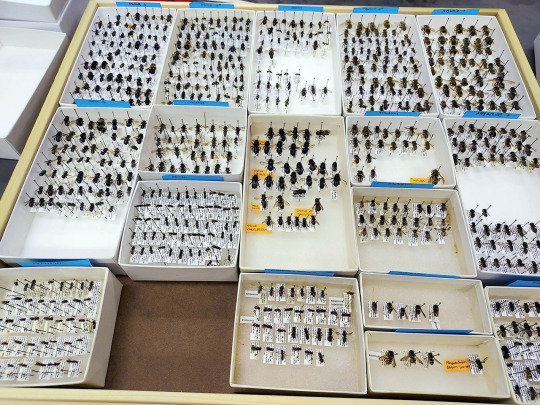
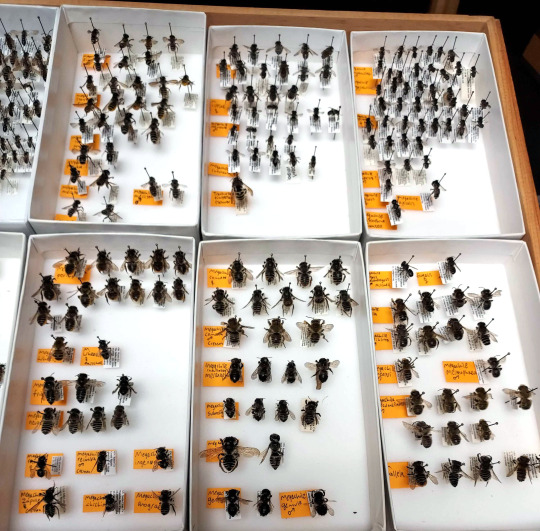
i got my PHD in entomology without a specific career in mind but knowing i wanted to do something that wasn't just about developing products and methods for killing unwanted insects which seem like the main entomology jobs anyone wants to fund anymore. in a perfect world i'd love a entomological curation job in a museum but those positions are rare and in-demand and i didn't have the mental fortitude to do the kind of academic work in grad school to make me competitive for that field. but then i went ahead and got a job that lets me do some curatorial work anyway so i sort of won? my position is still at least on paper about controlling unwanted insects but in practice i rarely have to do much of that work, at least directly.
i get semi-regular requests for advice on getting a job as an entomologist and i often feel like i don't have much constructive or encouraging to say, since it's hard not to feel like it's one of the many disciplines being squeezed to death by the iron hand of capitalism. more and more positions in the government and academia are being cut or downsized by bureaucrats who don't see the benefit of taxonomy or any other research that doesn't directly result in their department or some corporation making a bunch of money. whole subdisciplines are dying out as the elder entomologists who were the sole sources of knowledge about them die off. there are entire groups of insects and other arthropods that are effectively impossible to identify to species now because the one taxonomic wizard who specialized on them died without having anyone to pass that knowledge onto. Donald Bright, the only living expert on bark beetles in the preposterously diverse and morphologically subtle genus Pityophthorus, died a few months ago without an heir that i'm aware of.
also most of the taxonomic research that is being done these days is all molecular systematics which i have Opinions about but this post is way too long already.
sorry. that was a bummer. i guess i'm proof that it is still possible to get a job like this today, even if i can't help but feel like it was mostly luck that got me here. plenty of the others in my academic cohort (that didn't burn out from grad school stress) also went on to get degrees in their field of study or at least adjacent to them. and again there are still plenty of entomology jobs in other sectors like agriculture, public health, nonprofits and NGOs and stuff like that. you also don't necessarily need an advanced degree in entomology for a lot of these, and a lot of people in the entomology field came in sideways through related disciplines like ecology, evolutionary science, general biology, or even things like viticulture and forensic science to name a couple examples from my own cohort.
looking back, that was mostly a lot of vague grumbling and not much concrete advice, but to be fair asking for "any advice" is a hard prompt to go off of so i tend to default to the kinds of grim thoughts that are usually rattling round in my brain. i may also be in an especially dour mood at the moment because even though my job isn't to my knowledge at any risk of being eliminated, my lab is currently being passively if not outright antagonized by higher-level bureaucrats for genuinely mysterious reasons and i will not elaborate on that any further for reasons i mentioned at the beginning. anyway! i am always happy to at least attempt to give more specific advice but i can't promise there won't be at least a little grumbling in that as well.
49 notes
·
View notes
Text
Molds, Mushrooms, and Medicines
This is the story of the human relationship with the fungi, from the billions of yeasts that live in the digestive system and cover our skin, to the fungi that we use as food and to produce medicines, and our dependence on mushroom colonies that sustain forests. Nicholas Money takes readers on a guided tour of a marvelous unseen realm, describing the continuous conversation between our immune systems and the teeming mycobiome inside the body, and how we can fall prey to life-threatening infections when this peaceful coexistence is disrupted. He also explores our complicated relationship with fungi outside the body, from wild mushrooms and cultivated molds that have been staples of the human diet for millennia to the controversial experimentation with magic mushrooms in the treatment of depression.
What is the big idea behind your book?
NPM: The big idea is that we are affected by fungi throughout our lives, from our fetal life in the womb, to birth, childhood, adulthood, and at the end of life. Fungi affect our bodies after death too, when their colonies participate in the decomposition of the solid tissues in the soil. The fungi are with us at every moment, in an intimate fashion as they reproduce on the skin and in the digestive system, and in an extended way when we use them as a source of food and medicines. This is an ancient relationship that has changed during our evolutionary history and intensified when we developed agricultural practices and, most recently, as we have adopted fungi in biotechnology. Our interactions with the fungi go even further when we think about our dependence on their ecological activities, including the roles of the fungi in fertilizing soils, purifying water, and supporting plants by forming mycorrhizas with their roots. I wanted to tell the whole story in this book, which has captivated me since I began working on the fungi as a graduate student in the 1980s. It is easy to dismiss the fungi as the stuff of fairy tales, but there is so much more to the deep relationship between humans and fungi.
What is one of the features of the book that you think will surprise readers?
NPM: The fast pace of discovery in medical mycology is really inspiring. Earlier generations of mycologists misunderstood the fungi that they found on the body, regarding most of them as germs that damaged hospital patients and overlooking the significance of the yeasts growing peacefully on everyone else. Even when molecular genetic techniques began to reveal the incredible diversity and number of microbes in the gut, the fungi were missed because the methods were limited to identifying the DNA sequences of bacteria. This picture is changing at last, and new investigative methods are exposing the yeasts and molds multiplying from scalp to toes on the outside of the body and from mouth to anus on the inside. As this examination of the fungi has proceeded, the vision of the microbiome as a mostly bacterial territory has shifted to an appreciation of the diverse communities of fungi that fight and cooperate with bacteria through webs of chemical interactions to make a living on the body. Through these innovations we are beginning to fathom the extraordinary influence of the mycobiome on our health and well-being.
“Appreciating the fungi … can begin with something as simple as looking at a mushroom—this beautiful oddity of nature—or inhaling the wondrous scent of a handful of rotting pine needles. There is so much beauty in this orgy of decomposition.”
What did you find most surprising when you were researching the subject of the mycobiome (the fungal part of the microbiome)?
NPM: The size of fungal cells is an esoteric detail with huge consequences. Billions of fungi, mostly yeasts, live in the gut alongside trillions of bacteria. These gut fungi weigh no more than a raisin, but their combined surface area is equivalent to an eight-person dining table. This huge area of fungal cell wall material is moving through the digestive system all the time, which may explain how the fungi punch above their weight in their effects on our health. Recent research has shown that yeasts and molds are associated with a range of illnesses in the gut ranging from inflammatory bowel disease to colorectal cancer. Although it is difficult to distinguish between cause and effect when we find changes in the numbers and types of fungi in these illnesses, some specialists are convinced that the fungi are a missing link in medicine.
What concerns you most about the future of our relationships with the fungi?
NPM: The ecological importance of the fungi, including their role in supporting plant growth and their efficiency as decomposers has led popularizers of mycology to suggest that fungi can restore logged forests, clean water polluted by oil spills, and even break down radioactive waste. These claims are unfounded, but they have convinced many young people that there are relatively simple remedies for the human impact on the biosphere. The actions of the fungi are amazing, but they will not save us from ourselves. In a similar vein, many of the assertions about the medicinal properties of mushrooms are absurd. Mycology is a field that has attracted a lot of wishful thinking, but I have always believed that the facts about the biology of the fungi are far more interesting than the fiction. This book sets the record straight.
Did anything make you laugh as you worked on this book project?
NPM: There is great humor in some of the pronouncements made by the more colorful figures who have promoted mycology in the last century. For example, Terence McKenna, who took “heroic doses” of drugs in the 1970s, declared that the psilocybin molecule found in magic mushrooms was so unusual that it must have originated elsewhere in the galaxy. He went on to postulate that psilocybin mushrooms were a higher form of intelligence that had arrived from outer space and shaped the evolution of the human brain. Although he faces some stiff competition, McKenna’s alien mushroom theory is one of the least enlightening things ever written about fungi. When you have made the scientific study of mycology your life’s work, as I have done, it impossible to treat anyone who takes an idea like this seriously as anything but a buffoon.
What is one of the questions that continues to puzzle researchers about the fungi?
NPM: Despite decades of research, we are a long way from understanding why only a few hundred of the hundreds of thousands of species of fungi damage our tissues. There are some clues. These include the way that some fungi can evade the body’s defenses by hiding inside the cells of the immune system until they find themselves inside the central nervous system. This is known as the Trojan Horse strategy and allows these microbes to reach the brain and cause mayhem. On the other hand, pathogenic fungi are not attacking us in any deliberate fashion, because the body is a dead end for them. Unlike viruses, fungi get stuck in our tissues and cannot get out. Some investigators are convinced that coping with the warmth of the body is a big part of the explanation for fungal virulence, but this mild thermotolerance is probably inconsequential. Tens of thousands of fungi that live in the soil can grow at our body temperature and never cause disease. The difference lies in the chemical conversations between the body and the microbes that cause problems, which explains why damage to the immune system makes us so vulnerable to fungal infections.
“Life without fungi is impossible. There are as many of them living on the human body as there are stars in the Milky Way and, more importantly, they have a far greater influence on our lives than all but one of these galactic incinerators. They are everywhere and will outlive us by an eternity: in myco speramus.”
Nicholas P. Money is professor of biology at Miami University in Ohio and the author of many books on fungi and other microbes, including The Rise of Yeast: How the Sugar Fungus Shaped Civilization, Mushrooms: A Natural and Cultural History, and Microbiology: A Very Short Introduction.
15 notes
·
View notes
Text
Not intended as a callout or jumping on anyone, but it is so fucking weird to see someone online calling something that I've actually worked on in the past a "special interest".
Like my hobbies and my career overlap so much that I get it can be hard to tell with me (eg, anything ecology related isn't actually my field, molecular bio and genetics is), the term just makes me feel weird. Like it's assumed the only reason you would ever like something, study something, or commit a career to something is because the neurodivergent superpowers activate.
I am neurodivergent but don't like to bring it up a lot for this exact reason for me personally. It feels like you're not allowed to be just, y'know, interested in something, and it's weird that somehow the concept of liking things has seemed to become a neurodivergent trait.
I 100% know that's never the intention here or from specific people iI know irl that I'm lowkey vaguing about, and it doesn't bother me too much, it's just something I've started to observe a lot. I'm sure someone else who actually knows more about neurodivergency and society probably could say more about how this fits in to neurodivergent stereotypes, particularly with autism and adhd, but I don't think I can give that kind of analysis.
If this post is objectionable to some people... yeah I get that. This isn't well thought through just kind of a random observation dump about my own unfocused feelings. Would be interested to hear people's perspectives.
62 notes
·
View notes
Text
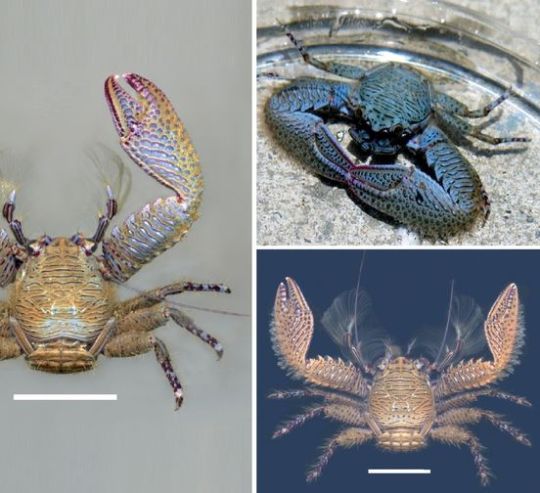
Description of a new species of the Petrolisthes galathinus complex from the Caribbean Sea, and resurrection of Petrolisthes occidentalis from the East Pacific (Crustacea, Anomura, Porcellanidae)
Alexandra Hiller, Bernd Werding
Abstract
The Petrolisthes galathinus complex currently consists of six American species distributed in the West Atlantic, including the amphi-American P. galathinus.
All species in the complex are similar in their adult morphology but differ in colour, size, larval morphology, and shape of the adult sternal plate.
The West Atlantic species have different geographic ranges, which overlap in the southern Caribbean. Previously published molecular data support the monophyly of the complex, and the reciprocal monophyly of each described species and further clades corresponding to different colour morphs.
Here, the morph P. caribensis “Blue” is described as Petrolisthes coeruleus sp. nov., and Petrolisthes occidentalis is formally resurrected for the Pacific individuals of P. galathinus.
By adding these two species to the P. galathinus complex, this now consists of eight species. Colour illustrations of all species and colour morphs are provided and their geographic distributions and ecological ranges are discussed and updated.
Read the paper here:
Description of a new species of the Petrolisthes galathinus complex from the Caribbean Sea, and resurrection of Petrolisthes occidentalis from the East Pacific (Crustacea, Anomura, Porcellanidae) (pensoft.net)
15 notes
·
View notes